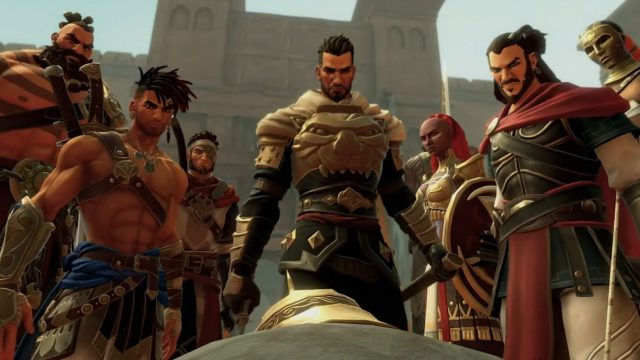Philippe Tremblay, director of subscriptions at Ubisoft, pissed a lot of people off last week. In an article published by Gamesindustry.biz titled “The new Ubisoft+ and getting gamers comfortable with not owning their games,” Trembly told GIB’s Christopher Dring about Ubisoft’s efforts to expand its subscription services to fans. Comparing consumer shifts in recent years regarding physical media, specifically CDs and DVDs, Tremblay said the following:
“They got comfortable not owning their CD collection or DVD collection. That’s a transformation that’s been a bit slower to happen [in games]. As gamers grow comfortable in that aspect… you don’t lose your progress. If you resume your game at another time, your progress file is still there. That’s not been deleted. You don’t lose what you’ve built in the game or your engagement with the game. So it’s about feeling comfortable with not owning your game.”
In fairness, this part of the article that is getting the bulk of fans’ ire has been taken out of context. Trembly was responding to a question from Dring asking “what is it going to take for subscription to step up and become a more significant proportion of the industry?” Tremblay also went on to say that he “still [has] two boxes of DVDs” and “definitely [understands] the gamers perspective with that.”
Yet, while Teremblay professes to “understand” the perspective of gamers, his followup sentence betrays an incredibly flawed interpretation of the paradigm between players and their games:
“But as people embrace that model, they will see that these games will exist, the service will continue, and you’ll be able to access them when you feel like. That’s reassuring. Streaming is also a thing that works really well with subscription. So you pay when you need it, as opposed to paying all the time.”
So while I can sympathize with Tremblay’s comments being taken out of context, the content of his statement is still nonetheless problematic. Let’s break down why:
You Have No Idea How Long These Games and Services Will Exist
Perhaps the most obvious and glaring counterexample to Tremblay’s assertion is the failure of Google Stadia. For those who don’t remember, Stadia was a cloud-based gaming platform where players never owned a console, instead utilizing streaming to access Google-powered hardware remotely to play games. Access was dependent upon paying for a subscription to the service and paying full price for each game. Once Stadia was shuttered by Google, players lost all access to those games (they were refunded for the software, but not for their subscription fees).
I’ve written about this before, but any sort of digital-only content that’s tethered to a company’s external servers is never going to be truly yours. The consumer, in that situation, is dependent on access being granted by the company to the content that they “own.” Which is a bit like having to ask permission every time you want to go into your closet to put on a jacket. There is no guarantee that any company, whether it’s Ubisoft or any other, will always be around.
Which means that any games you’re enjoying playing will exist… until they don’t. Until the company shuts down. Until licensing deals change. Until your access is denied for any number of external, out-of-your-control-reasons. Make no mistake, digital content on digital platforms that you don’t have direct control over are not things that you own and are not guaranteed to exist in a state of perpetuity by any stretch of the imagination.
Streaming Works Well for Some, Not for Most
I realize this might be hard for executives at game studios to understand, but not every customer lives in New York or California. Internet connections are miles better than they used to be in many parts of the US, but having a connection stable enough to stream games on is still a relative luxury to most. Pretending that the average consumer can easily jack in and play games remotely is a fallacy, and one proven to be so by the failure of the aforementioned Stadia platform. It, too, was limited by the marginal Internet capabilities of most Americans.
Also, bear in mind that I’m limiting my scope to the US, when this is a reality that people all over the world face. No matter where Ubisoft or any other game dev sets its sights on making streaming the de facto way of playing, there are too few places in the world where this is viable. What does work, however? Proper game downloads and physical discs and cartridges.
Speaking of Paying All the Time…
This is another point that I have made in the past that could stand to be repeated here, which is that subscription services are nothing but glorified rental programs. The consumer is drawn in by the allure of ease of access and the promise of heaps of content, but ultimately there’s no difference between subscribing to Game Pass versus walking into a Blockbuster every week and paying to rent media.
Subscription services mean monthly or annual payments. That is paying all the time. And as much as publishers want to push the so-called value of these models for consumers, it’s hard to feel like anyone is getting a bargain when the costs keep adding up. Look no further than the expense of being subscribed to Netflix, Hulu, Amazon Prime Video, Max, Peacock, Paramount+, and so on—the cost quickly starts to mount. Let’s also not forget that the list I just provided is a partial one, and only for video content. Now start thinking about the cost of music services. If you’re an artist, maybe you pay monthly for Adobe software or Clip Studio. What about people who shop with services like Amazon Prime and Walmart+?
Even if you only have gaming subscription services, it doesn’t change the fact that in order to access them, you will indeed be paying—all the time. And own nothing for all that money spent. But hey, at least you’ll have the memories… right?
I could expand more on this, and maybe I’ve already gone on for too long, but I hope the message is clear to Ubisoft and every other publisher: you’re all pushing for a future that I’m not interested in. This soulless, digital world where everything is ordered and delivered, everything you love is tethered to a login to a corporate-run server somewhere, and on and on. Consumers have to take a stand. Demand physical media, demand to own your games.




 ShareThis
ShareThis










